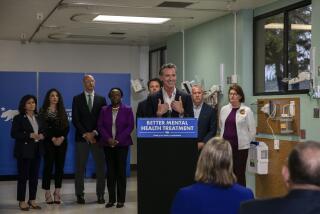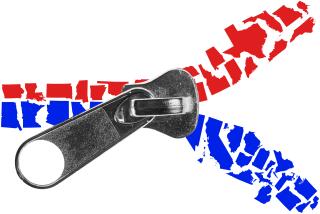States Warned They May Be on Their Own
WASHINGTON â Struggling states will have to solve their fiscal difficulties without massive federal assistance, a Republican senator warned the nationâs governors Sunday, highlighting sharp political disagreements over Washingtonâs responsibilities to states facing historic budget shortfalls.
The governors spent much of Sunday trying to resolve their own conflicts on the subject of federal aid before pressing their case with President Bush during a White House meeting scheduled for this morning.
âWeâre trying to reach a consensus on a resolution for fiscal relief and Medicaid reform,â California Gov. Gray Davis said shortly after he and most of the nationâs governors concluded an intense, closed-door discussion. âItâs not quite cooked yet. We are making progress.â
Davis, who estimates that California must close a $34-billion budget gap over the next 16 months, described the disagreements as âcivil but spirited.â
The political discord among the governors -- gathered for the winter meeting of the National Governors Assn. -- simmered to the surface during and after a session on the statesâ fiscal crisis.
Republican governors are embracing a limited federal response, while some Democratic governors are endorsing proposals from congressional Democrats that would provide states with as much as $75 billion in aid.
Without federal intervention, states must cut spending and raise taxes by an estimated $112 billion over the next 18 months, the association projects.
In the morning sessionâs keynote address, Sen. Larry E. Craig (R-Idaho) chided the states for overspending during the 1990s and warned the governors against overreaching in their requests for federal aid. His comments came moments after Kentucky Gov. Paul E. Patton, a Democrat who chairs the governors association, made a pointed plea for âurgent fiscal reliefâ from Washington.
âThis is not a partisan issue,â Patton said.
Craig, however, accused congressional Democrats of exacerbating the plight of the states by delaying action on the 2002-03 federal budget and by opposing the presidentâs plan to stimulate the economy by cutting taxes. And he pointedly advised governors against pressing Congress to support Democratic proposals that would funnel tens of billions of additional aid to states.
Craig said the Republican majority in Congress âmight be ableâ to provide some additional assistance for health care and Medicaid, the program for lower-income Americans that receives joint federal-state funding and is administered by the states. Also, he predicted Congress would pass a prescription drug bill that could ease state health-care costs.
Democrats reacted coolly to Craigâs comments.
âI certainly accept your call that the states should do their part in these difficult times, and I think we all are,â said Wisconsin Gov. James Doyle. âBut I hope thereâs some consideration being given for the increased efforts that we are having to pick up right now to fulfill basic federal obligations in senior health care and special education.â
But Nebraska Gov. Mike Johanns, a Republican, praised Craig for his honesty and expressed support for the opposition to a âmassive bailout.â
Gov. Jeb Bush of Florida, younger brother of the president, remained silent during the public discussion. Afterward, he told reporters the presidentâs tax-reduction plan would be far more helpful to states than billions of dollars in federal aid.
âA onetime bailout only makes the hole bigger when the bailout ends,â Bush said. âWe have some responsibility in this. You canât just spend everything you have during good times and when thereâs a downturn say, âWell, itâs not our fault.â â
Davis said there was a growing consensus on the issue of federal reimbursement to the states for the costs of homeland security -- an idea that Craig said has Republican support in Congress.
Davis is also advocating federal reimbursement for the cost of incarcerating illegal immigrants who commit a crime once they arrive in a state. âI think most governors want to come away from this conference on record in favor of fiscal relief,â Davis said. âThe question is what form will the resolutions take.â
Later Sunday, Patton and Idaho Gov. Dirk Kempthorne, a Republican who is the associationâs vice chairman, were working to draft a proposal to bridge the differences between Democrats and Republicans on the scope of fiscal relief to the states. Their goal is a resolution that can be approved by the governors before the meeting ends Tuesday, Davis said.
More to Read
Get the L.A. Times Politics newsletter
Deeply reported insights into legislation, politics and policy from Sacramento, Washington and beyond. In your inbox three times per week.
You may occasionally receive promotional content from the Los Angeles Times.










